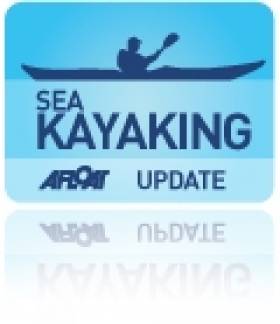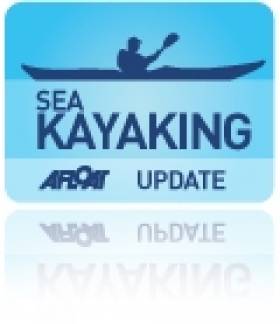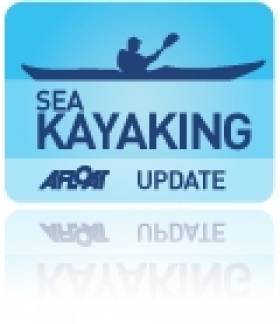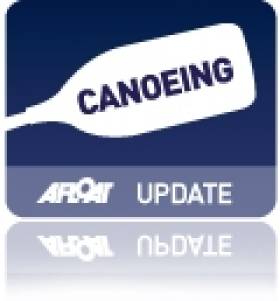Displaying items by tag: David Burns
'Ireland's Toughest Race' Brings Elite Athletes To Donegal
#Kayaking - It's been two years since David Burns and Maghnus Collins completed their epic 16,000-mile, 292-day Silk Roads to Shanghai adventure by foot, bike, raft and kayak.
They became in the process the first people to navigate Asia's longest river, the Yangtze, from source to sea by kayak.
In the meantime, they've kept their ambitions closer to home, but no less adventurous – starting a gruelling 24-hour challenge in the rugged landscape of Donegal simply called The Race.
As SportsJoe.ie reports, The Race is no ordinary race. Think a triathlon – running, cycling and swimming – but swap out the swimming for kayaking, add on an extra discipline (in thus case climbing) and cap it off with a full marathon run through the night.
All in all, competitors must cover a distance of 250km within 24 hours. And amazingly, there are some who can do that with hours to spare.
Take Canadian athlete Ben Wells, who set the record of 15 hours and 22 minutes in last year's race, and believes that even that time can be beaten in this year's even scheduled for next weekend, 7-8 March.
But for most of those taking part, only 10% "will be aiming to win it," says Burns. "The rest will be testing themselves against the course.
"The camaraderie was massive last year - everybody was willing the next person on, giving encouragement. We're expecting the same this year."
SportsJoe.ie has much more on the story HERE.
Irish Duo Reach End of Asian Adventure By Kayak
#Kayaking - David Burns and Maghnus Collins yesterday celebrated the end of their 16,000-mile Silk Roads to Shanghai adventure across Asia by foot, bike, raft and kayak.
Ten days ago we reported that the duo were in Wugu on the Yangtze River, just 450km away from completing their epic 292-day journey from Istanbul to Shanghai - and becoming the first people to navigate Asia's longest river from source to sea by kayak.
But as Shanghai Daily reports, the Irishmen have reached their destination in one piece, and received a rapturous welcome from the city's Irish community at the Bund yesterday morning.
Burns and Collins, from Derry and Limerick respectively, negotiated the final leg of their charity challenge in sea kayaks, battling rapids and avoiding dangerous wildlife such as bears and wolves.
And on arrival in Shanghai they paid tribute to the kindness and generosity of the Chinese people they met along the way.
"Chinese people were incredible for the whole journey as they offered help everywhere," said Burns. "The fishermen gave us tea when we were cold and gave us food when we were hungry. We were well looked after."
Shanghai Daily has more on the story HERE.
Irish Adventurers First To Take On The Yangtze By Kayak
#Kayaking - Last April Afloat.ie highlighted two intrepid Irish adventurers on the first leg of a gruelling 16,000-mile charity trek across Asia - by foot, bike, raft and kayak - along the Silk Roads to Shanghai.
But as the New Year began last week - just over eight months later - the duo of Maghnus Collins and David Burns were just 450km away from completed their epic journey, as The Score reports.
Limerick man Collins told the sports website that he and Derry native Burns were at Wuhu, a city on the Yangtze upstream of Shanghai, and from where the pair will tackle the rest of the route along the river by kayak.
It's surely incredible enough that Collins and Burns ran the equivalent of 25 marathons in 27 days as they crossed Tibet to the source of Asia's longest river - but being the first ever kayakers to navigate the "incredibly dangerous" Yangtze from source to sea is almost beyond belief.
Little wonder, then, that they've so far raised €30,000 for Irish-based charity Self Help Africa, and will surely reach their target of €50,000 by the time they expect to reach the finish line this day next week.
The Score has more on the story HERE - and listen to an interview with Collins and Burns on Today FM's The Last Word with Matt Cooper (at the 41-minute mark of part 2).
#KAYAKING - Two intrepid Irish adventurers are crossing Asia on the first leg of their 16,000 trek along the Silk Roads to Shanghai, The Irish Times reports.
Limerick's Maghnus Smyth and David Burns from Derry will be making their way entirely self-propelled by foot, bicycle, canoe and kayak across the Asian continent to the world's largest city, all in aid of Irish-based charity Self Help Africa.
The duo is currently well into an 8,500km cycle across Iran, Pakistan, India and Nepal to the Tibetan plateau, from where they will run through the Himalayas to the source of the Yangtse.
That point marks the start of an epic 6,300km kayak run along the river's length to Shanghai.
To keep track of their adventures and donate to their charity fund, visit their adventure blog at sand2snowadventures.com.
































































